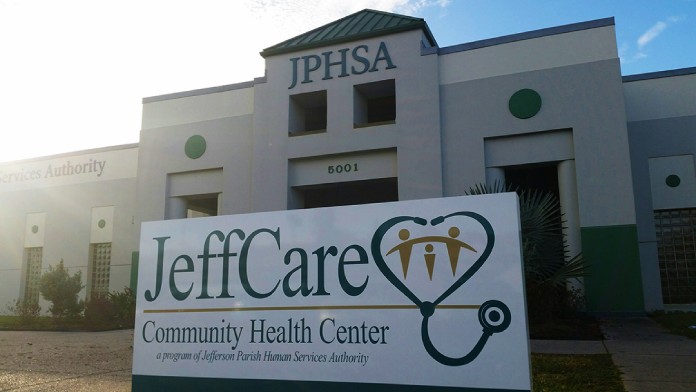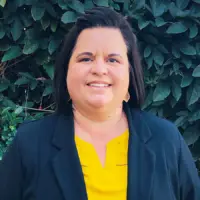Several programs and therapists, sadly that's not worth it if you can't get an appointment. Here, the service is THE SLOWEST, and you can tell how little they care about helping you.
About Jefferson Parish Human Services – West Jefferson Health Center
Jefferson Parish Human Services – West Jefferson Health Center in Marrero, Louisiana, provides treatment to all ages. Addictions treated include substance abuse and gambling. Individuals with physical and intellectual disabilities are accommodated, and interpreter services are available. The center practices social inclusion with all clients receiving equal opportunities free of discrimination or stigmas.
Admission and treatment priorities begin with pregnant injecting drug users. Following are other pregnant substance users, then injecting drug users. The center accepts Medicaid and bases cash-pay fees on a sliding scale in consideration of household income and size. The center is accredited by the Council on Accreditation.
Therapy for Substance Use Disorder
Behavioral therapies used include multisystemic therapy which integrates family, peers and community for substance use treatment. Functional family therapy seeks to improve family function through communication, reduction of negativity and healthy relationships.
New Client Assessment
The center will assess a new client to determine the treatment services needed. Clients will either transition to a residential program or receive a treatment plan for outpatient substance abuse services. Clients are assigned a case manager who will offer community support services for employment assistance, vocational counseling, independent living and housing resources.
Crisis Services
The center offers a first-episode psychosis program. Mobile crisis services will come to a client’s location in the event of a crisis.
The Eunoia Center is a daytime crisis respite program that provides immediate support and referrals for ongoing mental wellness. This program is preferable to a hospital visit with a comfortable, calm, homestyle setting. The program is available to clients 18 and older and is always open.
Convenient Location in Marrero
For those using the transit system, a bus stop is located just behind the facility. The Center is also located near several eateries for a quick bite before or after treatment. Areas for reflection after a therapy session are available just across the Mississippi River. The Vue Orleans Observation Deck, Woldenberg Park, Mississippi River Meditation and French Quarter RiverWalk all offer scenic waterfront views.
Latest Reviews
Rehab Score
Gallery


Other Forms of Payment
Medicaid is a state based program that helps lower-income individuals and families pay for healthcare. Medicaid covers addiction treatment so those enrolled can use their coverage to pay for rehab. When a program accepts Medicaid the client often pays very little or nothing out of their own pocket.
Private insurance refers to any kind of healthcare coverage that isn't from the state or federal government. This includes individual and family plans offered by an employer or purchased from the Insurance Marketplace. Every plan will have different requirements and out of pocket costs so be sure to get the full details before you start treatment.
Self-pay involves paying for treatment out of your own pocket. You can use savings or credit, get a personal loan, or receive help from family and friends to fund your treatment. If you don't have insurance or your insurance plan doesn't cover a specific program, self-pay can help ensure you still get the care you need.
Financial aid can take many forms. Centers may have grants or scholarships available to clients who meet eligibility requirements. Programs that receive SAMHSA grants may have financial aid available for those who need treatment as well. Grants and scholarships can help you pai for treatment without having to repay.
Sliding scale payments are based on a client's income and family size. The goal is to make treatment affordable to everyone. By taking these factors into account, addiction recovery care providers help ensure that your treatment does not become a financial burden to you or your family, eliminating one barrier to care.
Medicare is a federal program that provides health insurance for those 65 and older. It also serves people under 65 with chronic and disabling health challenges. To use Medicare for addiction treatment you need to find a program that accepts Medicare and is in network with your plan. Out of pocket costs and preauthorization requirements vary, so always check with your provider.
Addiction Treatments
Levels of Care
Outpatient Programs (OP) are for those seeking mental rehab or drug rehab, but who also stay at home every night. The main difference between outpatient treatment (OP) and intensive outpatient treatment (IOP) lies in the amount of hours the patient spends at the facility. Most of the time an outpatient program is designed for someone who has completed an inpatient stay and is looking to continue their growth in recovery. Outpatient is not meant to be the starting point, it is commonly referred to as aftercare.
Treatments
Mental health rehabs focus on helping individuals recover from mental illnesses like bipolar disorder, clinical depression, anxiety disorders, schizophrenia, and more. Mental health professionals at these facilities are trained to understand and treat mental health issues, both in individual and group settings.
Programs
Adult rehab programs include therapies tailored to each client's specific needs, goals, and recovery progress. They are tailored to the specific challenges adult clients may face, including family and work pressures and commitments. From inpatient and residential treatment to various levels of outpatient services, there are many options available. Some facilities also help adults work through co-occurring conditions, like anxiety, that can accompany addiction.
Young adulthood can be an exciting, yet difficult, time of transition. Individuals in their late teens to mid-20s face unique stressors related to school, jobs, families, and social circles, which can lead to a rise in substance use. Rehab centers with dedicated young adult programs will include activities and amenities that cater to this age group, with an emphasis on specialized counseling, peer socialization, and ongoing aftercare.
Clinical Services
Cognitive Behavioral Therapy (CBT) is a therapy modality that focuses on the relationship between one's thoughts, feelings, and behaviors. It is used to establish and allow for healthy responses to thoughts and feelings (instead of unhealthy responses, like using drugs or alcohol). CBT has been proven effective for recovering addicts of all kinds, and is used to strengthen a patient's own self-awareness and ability to self-regulate. CBT allows individuals to monitor their own emotional state, become more adept at communicating with others, and manage stress without needing to engage in substance abuse.
Whether a marriage or other committed relationship, an intimate partnership is one of the most important aspects of a person's life. Drug and alcohol addiction affects both members of a couple in deep and meaningful ways, as does rehab and recovery. Couples therapy and other couples-focused treatment programs are significant parts of exploring triggers of addiction, as well as learning how to build healthy patterns to support ongoing sobriety.
Dialectical Behavior Therapy (DBT) is a modified form of Cognitive Behavioral Therapy (CBT), a treatment designed to help people understand and ultimately affect the relationship between their thoughts, feelings, and behaviors. DBT is often used for individuals who struggle with self-harm behaviors, such as self-mutilation (cutting) and suicidal thoughts, urges, or attempts. It has been proven clinically effective for those who struggle with out-of-control emotions and mental health illnesses like Borderline Personality Disorder.
Research clearly demonstrates that recovery is far more successful and sustainable when loved ones like family members participate in rehab and substance abuse treatment. Genetic factors may be at play when it comes to drug and alcohol addiction, as well as mental health issues. Family dynamics often play a critical role in addiction triggers, and if properly educated, family members can be a strong source of support when it comes to rehabilitation.
Group therapy is any therapeutic work that happens in a group (not one-on-one). There are a number of different group therapy modalities, including support groups, experiential therapy, psycho-education, and more. Group therapy involves treatment as well as processing interaction between group members.
In individual therapy, a patient meets one-on-one with a trained psychologist or counselor. Therapy is a pivotal part of effective substance abuse treatment, as it often covers root causes of addiction, including challenges faced by the patient in their social, family, and work/school life.
Nicotine Replacement Therapy (NRT) is a way of getting nicotine into the bloodstream without smoking. It uses products that supply low doses of nicotine to help people stop smoking. The goal of therapy is to cut down on cravings for nicotine and ease the symptoms of nicotine withdrawal.
Trauma therapy addresses traumatic incidents from a client's past that are likely affecting their present-day experience. Trauma is often one of the primary triggers and potential causes of addiction, and can stem from child sexual abuse, domestic violence, having a parent with a mental illness, losing one or both parents at a young age, teenage or adult sexual assault, or any number of other factors. The purpose of trauma therapy is to allow a patient to process trauma and move through and past it, with the help of trained and compassionate mental health professionals.
Staff

Rosanna DiChiro Derbes, PsyD
Executive Director

Christy Dempster
CFO

Nicole Sullivan-Green
Developmental Disabilities Community Services

Jennifer Zinter
Behavioral Health Community Services Division

Chandra Carr-Lamothe
Division Director

Shawnta Gardener-Taylor, MS, LPC
Chairperson

Robin Parker-Brooks, DBH, LMSW
Vice Chairperson

Patricia C. Ehrle
Finance & Accounting Professional
Contact Information
5001 Westbank Expressway
Suite 100
Marrero, LA 70072